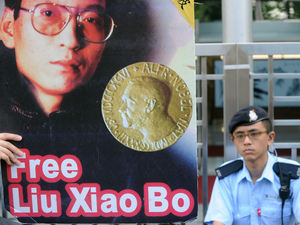舞蹈的夜玫瑰
刚刚开博,还没想好专注什么,写着看吧。:)Is Today's Peace Prize What Nobel Intended?
While human-rights advocates hailed the choice to bestow the 2010 Nobel Peace Prize on Chinese dissident Liu Xiaobo, not everyone thinks the decision was in line with Alfred Nobel's original intent in developing the award.

A bust of Nobel Prize founder Alfred Nobel, in Stockholm. Nobel, an arms tycoon, wanted his peace prize to honor people who worked toward disarmament.
Fredrik Heffermehl, a researcher in Norway, says Nobel intended that the prize should be given to encourage disarmament and international peace efforts. As a Swedish tycoon who had built his fortune selling cannons and munitions, including dynamite, Nobel wanted to counter some of the worst effects of his own products.
According to Nobel's will, the prize was to go to the person who "shall have done the most or the best work for fraternity between nations, for the abolition or reduction of standing armies, and for the holding and promotion of peace conferences."
It says nothing about human-rights activism.
In the early years of the prize, it was awarded mainly to people involved in promoting peace and international arbitration. President Theodore Roosevelt got it for mediating an end to the Russo-Japanese War. President Woodrow Wilson won it for helping to found the League of Nations.
Using The Prize To Make A Political Point
The trend of giving the prize for other reasons began in 1960, when South African chieftain Albert Lutuli received the prize for his nonviolent opposition to apartheid.
American Martin Luther King Jr. received the award in 1964 for his civil rights work, and Soviet dissident Andrei Sakharov won in 1975. Aung San Suu Kyi of Myanmar in 1991, and Iran's Shirin Ebadi in 2003 won the award for their struggles on behalf of democracy and human rights.
Last year's peace prize, given to President Obama, was widely seen as a rejection of the unilateral foreign policies of his predecessor George W. Bush.
Muhammad Yunus of Bangladesh won in 2006 for advancing economic opportunities for the poor. Former Vice President Al Gore was praised for raising awareness of climate change as he won the prize in 2007.

A policeman watches demonstrators in Hong Kong, next to a poster calling for the release of jailed Chinese dissident Liu Xiaobo, who won the Nobel Peace Prize for 2010.
Heffermehl, who's written a book called The Nobel Peace Prize: What Nobel Really Wanted, says that no matter how worthy these achievements may be, they're not what Nobel intended to foster.
"With all due respect to Liu Xiaobo, this is yet another example that this is no longer Nobel's prize; it is the peace prize of the Norwegian Parliament. The best the committee could do for human rights, democracy, poverty alleviation and environmental protection would be to wholeheartedly defend the work that Nobel would support, for deep change of international relations and abolition of national military forces," Heffermehl said in a statement.
Joseph Nye, a professor at Harvard's Belfer Center for Science and International Affairs, says the Nobel committee "may have stretched a bit to do things that Nobel may not have had in mind."
"Some might argue that if you look back historically to the prize given to Teddy Roosevelt, he was playing old-fashioned balance-of-power politics," Nye says. He adds that prizes like Roosevelt's, and that of former Secretary of State Henry Kissinger, might be seen as as "more classical prizes."
"It certainly is true that when they were thinking about peace a century ago, it was a rather simplistic view of peace," Nye says.
Philanthropists such as Nobel or Andrew Carnegie believed that peace could be achieved if the right international structure were put in place, he says.
"Diplomacy [in Nobel's day] revolved around traditional sovereign states," says Charles Kupchan, a professor at Georgetown University and a senior fellow at the Council on Foreign Relations. "Peace was negotiated by aristocrats wearing top hats. That world is mostly gone, so I don't think it's an accident that the Nobels of late are going to human-rights activists and people who are far from the world of diplomacy."
Kupchan says social movements and people who are not part of government structures play a more influential role in peace efforts today.
Some peace advocates argue that peace can only be achieved when the international community meets the needs that people most often fight over. Nongovernmental groups such as the Italian-based No Peace Without Justice specifically focus on human rights, democracy and rule of law as prerequisites for peace.
Why Not A Prize For The Internet?
This year, in fact, the Internet was one of the nominees for the Nobel Peace Prize. It was nominated by Italian journalist Riccardo Luna, peace laureate Shirin Ebadi and members of Italy's Parliament.
In making the nomination, Luna, the editor of Wired Italy, called the Internet "the first weapon of mass construction, which we can deploy to destroy hate and conflict and to propagate peace and democracy."
He cited the use of the Internet by democracy advocates in Iran to protest the results of the 2009 elections there.
Critics rejected the idea, noting that the Internet is a tool used by pornographers and terrorists as well as peace advocates.
In an online debate with Luna, technology blogger Evgeny Morozov, a fellow at the New America Foundation, asked, "Would we ever give the Nobel award to the machine gun just because it could be used by U.N. peacekeepers? "





还有那个入了法国籍的高行健得了文学奖。我特地去看了他的获奖作品,长篇小说《灵山》,被诺奖评委会称为“无以伦比的罕见文学杰作,也是一部朝圣小说”。看完以后的感觉就是不知所云,不知道诺奖委员会怎么看出其中伟大光辉的。反正按白居易诗歌的浅显易懂的标准《灵山》是很不合格的。
再有就是奥巴马刚上台就获和平奖,让我对诺奖里和平文学二奖信心大打折扣。后来看到这篇文章,觉得分析得很有道理。